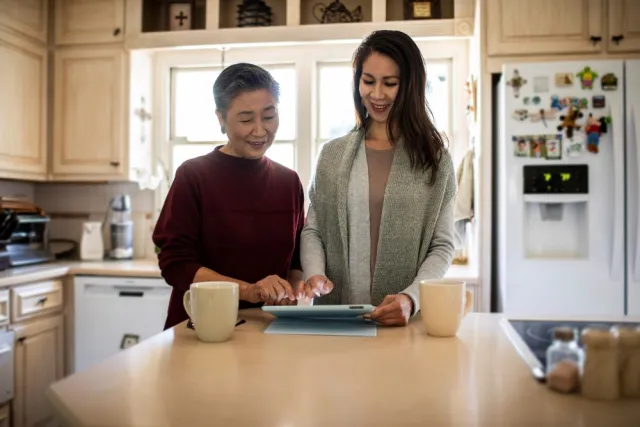Coping With Caregiving Demands
Table of Contents

You might find yourself in an unfamiliar role when caring for a loved one with cancer: care coordinator. Your role might include managing schedules, medications, doctor’s appointments, contacts, resources, insurance, bills, and more. Discover strategies and resources to help you cope with the demands of these new routines and responsibilities.
10 Tips for Caregivers
This quick guide gives tips for caregivers of people with cancer. A caregiver is someone who provides emotional support, goes to appointments, helps with decision making, coordinates care, helps with transportation, or helps manage finances. Some…
Coordinating Medical Care for Your Loved One
For some people, the role of care coordinator comes naturally. For others, this is a new world to navigate. Starting the process can be overwhelming. You might manage the following responsibilities alone or with the help of others:
Medical research – You may find yourself researching to better understand your loved one’s diagnosis, treatment, side effects, and care plan. You may even research doctors or hospitals online. If you are not computer savvy, ask someone in your family to do some research for you. Then have them report back to you.
Scheduling doctor’s appointments – There will be many appointments with the healthcare team, such as daily radiation or chemotherapy treatments, or physical therapy. Keep a notebook (or an online spreadsheet) with names, contact numbers, and a calendar of appointments. This will help things run smoothly, and you will have easy access in times of emergency or questions.
Meeting with the healthcare team – It can be important that you, or someone you and your loved one choose, be at doctor’s appointments. Caregivers can take notes, ask questions and be a sounding board. Preparing a list of questions ahead of time and taking good notes will help.
Medication management – Your loved one will likely have many medications that change frequently. Coordinating, filling, and administering prescriptions can be a job in itself.
Work with your pharmacist or doctor to understand instructions, refills, and dosing. A pill box or chart may help you keep track of what medication is given when. Pharmacists sometimes will package medicines together in packets for daily use, which can be helpful. A home healthcare agency can also come in to organize medications a few times a week. If you feel that your loved one would benefit from home healthcare, speak to your healthcare team. They can help you investigate your options for extra help at home.
Seeking help from others – It is OK to ask for help with some of the practical aspects of coordinating care. For example, family, and friends could drive your loved one to appointments, make meals, or research information. There are also professional services that can help. These include home care agencies or other community services. Being a coordinator doesn’t mean you have to do it all yourself. Your healthcare team can also help you find local agencies, resources, or online apps.

Organize Help Among Friends & Family
Our free digital support community offers a scheduling tool that can help you coordinate assistance with meals, rides to appointments, and other tasks.
Take Steps to Avoid Burnout
As a caregiver, you may be focused on balancing new roles and demands in your life. You may forget to take care of yourself, or you may feel out of control. It is OK to know your own strengths and limitations. Recognize when you need help and ask for it. There may be care tasks that others can help with to leave you some time for yourself. Taking care of you is an important part of being a caregiver.
Healing Light Meditation
Healing Light Meditation is a guided meditation that uses breath, visualization and intention to call upon healing within. As you follow along, truly believe in the practice and you shall receive. Meditation is like a mirror that polishes the…
Providing Physical or Medical Care to Your Loved One
Cancer can mean many changes at home, including new roles as you assist your loved one. Sometimes, this can mean helping your loved one in new ways with their physical or medical needs. This can be stressful at times, especially if you have not had training or experience. Talk to your loved one’s healthcare team about expectations and how you can prepare. You don’t have to know how to do everything all at once.
Partner With Your Medical Team
It is important to make sure that you and your loved one are safe at home. Providing physical care to someone else can feel overwhelming. Caregivers might feel anxious about assisting with medical devices or medications. Others might have concerns about helping with basic needs, including bathing, eating, or using the toilet.
You are not alone. Support systems like your loved one’s medical team and home health aides can help. Your loved one’s medical team, including social workers and navigators, can be a great resource. Talk to them about strategies and in-home support you may be eligible for.
In-home support can also help you manage physical care and identify what other support resources may be helpful. Consider asking for a referral to occupational therapy for adaptive devices (e.g., shower seat, grab bars) to meet your loved one’s needs and keep them safe. Sometimes, your healthcare team can arrange for a nurse or physical therapist to come to the home. Remember that the pharmacist is also a valuable resource if you have questions about medicine.
You may know your loved one better than anyone else. You likely spend much more time with them than any doctor or nurse. For this reason, you are a crucial part of your loved one’s healthcare team. They need to know how your loved one is doing from your point of view. Keep these pointers in mind:
- Trust your instincts. If you see a change in your loved one, speak up. Caregivers may learn medical management of small things to help their loved one at home. For example, you may learn how to assess and medicate for nausea or constipation.
- Ask the healthcare team to teach you how to support your loved one with activities (e.g., eating, bathing). If any new task feels overwhelming, ask for extra guidance.
- If you are confused or overwhelmed, call the healthcare team. Make sure you have a phone number to call if needed.
- Home health nurses can help with more complicated medical tasks like dressing changes.
Sometimes you can join your loved one at medical appointments. Other times you may not be able to join them, or they may prefer to go alone. Here is an appointment checklist that you can use or share with your loved one:
- Try to make appointments that work with your schedule and note them in your calendar.
- Confirm with the healthcare team about what to bring.
- Arrange transportation before the appointment.
- Write down questions in advance and make sure to ask them.
- Take notes or ask to record the conversation with the healthcare team.

Reach Out for Support
We offer free navigation for cancer patients or their loved ones.
Tips to Cope With the Demands of Your Role
Remember that you are human. Think of this as a marathon, not a sprint, and pace your energy. Remember to:
Make time for yourself. Tune into how you’re feeling and take time to do what makes you happy.
Find support. Support groups are for you and your loved one. Ask your loved one’s healthcare team about local support groups.
Take note of how you are feeling. Caring for a loved one can be challenging and emotional. It can cause feelings of resentment, or it may deepen your relationship. Be in touch with your feelings. If you’re overwhelmed, ask for help.

Providing Transportation for Appointments
Usually, when someone has cancer, they have many appointments to go to. These include doctor’s visits, scans, blood tests, treatments, or any combination of these.
Getting to appointments can be hard for many reasons. Treatments like radiation can happen daily for several weeks. Usually, one person cannot provide transportation to every appointment. You may need the help of others. Public transit can be hard to use if your loved one is feeling weak or ill. It is usually not an option. Some people travel long distances for cancer treatment. The cost of gas and parking can be unmanageable.
While it is challenging to get to all these appointments, it is critical that your loved one does their best to go to the appointments as scheduled.
Here are some tips to find help with transportation:
- Start with family and friends. Asking for help can be hard, but you will find that people want to help. Some people already may have said to you, “Please let me know how I can help.”
- Online scheduling tools can help people see what is needed and sign up for times they are available.
- Faith-based groups may have volunteers who can help with transportation. If you belong to a faith-based group, reach out for help.
- Ask your healthcare team to connect you with a social worker or navigator. They can help you find local transportation programs. Tell them if you are concerned about the costs of rides, gas, or parking. Some local agencies provide low-cost or free local transportation to senior citizens and people with disabilities.
- Ask your healthcare team if they can make your schedule more convenient. Can your loved one get labs on the same day they see their doctor? Or can the doctor’s visit be conducted via video?

Find Your Location
Find a caring and supportive Cancer Support Community location near you.